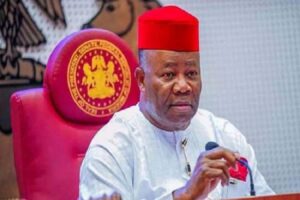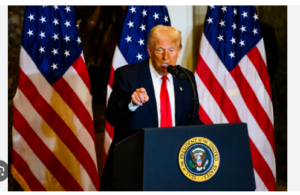
08. October (THEWILL) – The laws establishing Nigeria’s three anti-graft agencies—the Nigerian Financial Intelligence Unit (NFIU), the Independent Corrupt Practices and Other Related Offenses Commission (ICPC), and the Economic and Financial Crimes Commission (EFCC)—have been challenged by sixteen states, including Kogi, and have forced the federal government to appear before the Supreme Court.
The Kogi Government, through its Attorney General, initially filed the complaint, which is marked SC/CV/178/2023. Other plaintiffs in the suit include Ondo, Edo, Oyo, Ogun, Nassarawa, Kebbi, Katsina, Sokoto, Jigawa, Enugu, Benue, Anambra, Plateau, Cross-River, and Niger.
The lawsuit was postponed till October 22 by a seven-member judiciary panel led by judiciary Uwani Abba-Aji. This was after more states were permitted to file suit as co-plaintiffs.

The states argued that the constitution is supreme and that any law that conflicts with it is invalid, challenging the constitutionality of the laws that established the EFCC and other anti-corruption agencies.
They said that the Supreme Court had decided that the EFCC Establishment Act included a United Nations Convention against corruption, citing the case of Dr. Joseph Nwobike and the Federal Republic of Nigeria.
The plaintiffs further claimed that the 2004 enactment of the EFCC Act violated the terms specified in Section 12 of the 1999 revised Constitution, which calls for the approval of the Act and other laws by a majority of the state Houses of Assembly.

Thus, they contended that, in accordance with the provisions of the constitution, the Act, as established, cannot be enforced in states that did not provide their consent.
Read more about politics
Akpabio bemoans the “japa” mentality and exhorts immigrants to love Nigeria more than wealth.
According to Mr. Akpabio, the exodus of Nigerians has had a detrimental impact on numerous industries, most notably the nation’s health and education systems.
Godswill Akpabio, the president of the Senate, has counseled Nigerians to love their nation more than they should leave it in search of better opportunities elsewhere.
During Tuesday’s plenary, Mr. Akpabio offered the counsel in response to a motion to address the “japa” issue.
He noted that the National Assembly members’ love for Nigeria comes first and is the reason they choose to remain in the nation.

And the nation is currently losing its knowledge. It would have been preferable if they had obtained those skills and gone back to Nigeria. However, I also believe that the terms of service are really responsible.
But I think that love for one’s nation should come before personal benefit. And for that reason, a lot of us decide to stay here. For that, I applaud you,” he replied.
According to Mr. Akpabio, there have been numerous effects on the nation’s health and education systems from the growing number of Nigerians migrating outside.
“As we speak, we are witnessing some individuals traveling outside while wearing various disguises. Thus, there is a serious issue with brain drain, not only in the field of education but also, and especially in the field of health. It has a big impact on us.
According to what I’ve read, around 22,000 health workers in the United States are Nigerians, making them among of the country’s finest medical professionals. And they’re succeeding splendidly. That is what I have seen in several stories.
Effects of education
The president of the Senate claimed that many higher education institutions suffer from a “Japa” condition, which leaves students to deal with staff shortages of up to 50%.








